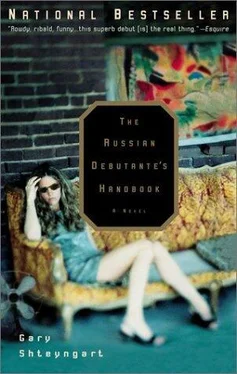Gary Shteyngart - The Russian Debutante's Handbook
Здесь есть возможность читать онлайн «Gary Shteyngart - The Russian Debutante's Handbook» весь текст электронной книги совершенно бесплатно (целиком полную версию без сокращений). В некоторых случаях можно слушать аудио, скачать через торрент в формате fb2 и присутствует краткое содержание. Город: New York, Год выпуска: 2003, ISBN: 2003, Издательство: Riverhead Books, Жанр: Современная проза, Юмористическая проза, на английском языке. Описание произведения, (предисловие) а так же отзывы посетителей доступны на портале библиотеки ЛибКат.
- Название:The Russian Debutante's Handbook
- Автор:
- Издательство:Riverhead Books
- Жанр:
- Год:2003
- Город:New York
- ISBN:0-7865-4177-6
- Рейтинг книги:4 / 5. Голосов: 1
-
Избранное:Добавить в избранное
- Отзывы:
-
Ваша оценка:
- 80
- 1
- 2
- 3
- 4
- 5
The Russian Debutante's Handbook: краткое содержание, описание и аннотация
Предлагаем к чтению аннотацию, описание, краткое содержание или предисловие (зависит от того, что написал сам автор книги «The Russian Debutante's Handbook»). Если вы не нашли необходимую информацию о книге — напишите в комментариях, мы постараемся отыскать её.
and
. The Russian Debutante’s Handbook Bursting with wit, humor, and rare insight,
is both a highly imaginative romp and a serious exploration of what it means to be an immigrant in America.
The Russian Debutante's Handbook — читать онлайн бесплатно полную книгу (весь текст) целиком
Ниже представлен текст книги, разбитый по страницам. Система сохранения места последней прочитанной страницы, позволяет с удобством читать онлайн бесплатно книгу «The Russian Debutante's Handbook», без необходимости каждый раз заново искать на чём Вы остановились. Поставьте закладку, и сможете в любой момент перейти на страницу, на которой закончили чтение.
Интервал:
Закладка:
One woman had a purse; she opened it and tore through a ream of facial tissues, new and used. She stole frightened glances at her compatriots until one of them—the blond spikes of her porcupine-cut bristling with authority—spoke up for her: “She doesn’t have a pen.” The others nodded.
“You need a pen?” It was the writer. He had pressed his lager against his cheek, which Vladimir took to be an international symbol of good will by way of mild inebriation.
“I need a pen,” Vladimir said, feeling the drama was about to come to a head. He crossed over to the writer mumbling thanks to the women for their effort (no response), and accepted a ballpoint. “Damn thing ran out,” Vladimir said.
“A writer carries two!” the writer barked. “Always.” He put the beer down and, with his round and cratered chin held high, appraised Vladimir as would a grade school principal his most bumbling charge.
“That one ran out too,” Vladimir said, although his strained voice pronounced him guilty—guilty of packing only one pen. “I’ve been writing too much today.”
Too much writing? Too much was never enough. Now it seemed for certain his idiocy would do him in, but instead the writer said: “Write anything good?”
“This poem about my Russian mother in Chinatown,” Vladimir said, trying to exoticize himself with as many ethnic references as possible. “But I’m just not getting it right. I came here, came to Prava, to get enough distance and I’m still lost.”
“How’d you get a Russian mother?” the writer asked.
“I am Russian.”
“Shhh.” They looked around. “The barmaid is Stolovan,” the writer explained.
A pair of uneven saloon doors separated the bar area from the rest of the joint; the Russophobic Stolovan was somewhere behind those doors. Vladimir looked down to his feet in embarrassment and took a swig of his beer in lieu of something to say. Yes, he was definitely starting to lose ground with all the fits and starts afflicting his attempts at conversation with the literary god. He decided, against his best instincts, to take a stab at honesty, that mortal enemy of the pyramid schemer. “I just got here,” he said. “I’m still a little out of it as far as the locals go.”
“Forget about them,” the writer said. “This is an American town. Why don’t you sit down? Come on, take a break from your Russian mommy poem for a second. Oh, don’t look so sore. Hell, I remember my mother-as-muse stage. Trust me, the maternal teat will still be there tomorrow morning.”
And then Vladimir knew he was going to like this guy. The helpful instructions about always having two pens, the worldly attitude toward the Stolovans, and now the learned appraisal of the maternal teat, all confirmed that the writer was what the uninitiated would call an asshole. But Vladimir knew these pretty castoffs of well-to-do America, cruising along on their five-year plan of alcoholic self-discovery, then trolling desperately for a five-year renewal option. Hell, I remember my mother-as-muse stage. What disarming aggression. It was Midwestern progressive college redux, confirmation that this Adonis was definitely in Vladimir’s cards, his “Patient Zero.”
Vladimir took a seat just as a second mint julep was brought out by the waitress, smiling soberly at her countrymen’s meeting of the minds. Vladimir polished off his first beer and placed it on the outgoing tray. “Another?” she said.
“Please.”
“Nuts?”
“No nuts.”
“Lemon?”
“ Sans lemon.”
“On me,” said the writer, impressed by the brevity, the honesty of the exchange. Now they were in Raymond Carver territory. “Drinking up a storm?” he said to Vladimir as the latter reached for the julep.
“Jet lag. I’m out of it,” Vladimir said. Think. Carver dialogue. Deceptively simple yet profound. “I haven’t got it all together yet,” Vladimir said, as he looked away mysteriously.
“You find a place to live?”
“My boss gave me a flat in the suburbs.”
“Boss?” The writer’s mouth came open revealing Yankee orthodontia at its best. He shook his head, his mane rippling; it felt very natural to just reach out and touch the silky thing. “You mean you got a job? With whom?”
The iconoclast scribbler seemed to perk up nicely at this mention of the material world. Vladimir imagined a background of worried parents, angry transatlantic phone calls, pouches full of law-school applications being dragged through the streets of Prava by exhausted Stolovan postmen. “A development firm,” Vladimir said.
“Development firm? What are you developing? My name’s Perry, by the way.” He stuck out a hand. “Perry Cohen. Yes, it’s a surprising name. I’ll have you know that I’m the only Iowa Jew ever.”
Vladimir smiled, thinking: what happens if there’s another Iowa Jew in the room when he introduces himself as the sole specimen? The embarrassment! He filed that one away for future leverage. “How’d you Jews get all the way out to Iowa?” he asked. (“I’m a Jew, too,” he added for reassurance.)
“My father’s the Jew,” Perry explained. “My mother’s the mayor’s daughter.”
“And the mayor let her marry a Jew. How nice.” There. He was catching the vibe. The expat, in-your-face vibe. “Your father must be blond like you. And assimilated, too.”
“He’s Hitler with a circumcision,” Cohen said. And as he said it, something uncalled for, perhaps even unscripted, took place: his head bent forward so that his mane naturally covered his face, and beneath the mane Vladimir noticed—what? A quick nasal exhalation to forestall a whimper? A rapid blinking of the eyes to shoo away the moisture? Teeth biting hard into a quivering lip to bring it back in line? But before Vladimir had a chance to ponder the question of whether this was a true display of emotion or a performance for his benefit, Cohen brushed his hair back, ahemed loudly, and regained his composure.
“Hitler, yes,” Vladimir said, eager to appear blithely unconcerned. “Do tell.”
And so Cohen told Vladimir the story of his father. The two men had known each other for two minutes now; a pen had been transferred from one to the other; ethnic backgrounds had been established; a few sallies had been launched. Was that all it took—the equivalent of two dogs sniffing out each other’s rear—to get the writer Cohen to tell the story of his father?
Could this story have been Cohen’s trademark then? His theme? One thing Vladimir had learned from his years of wandering and self-invention was that it was important to have a theme. A coherent story you could riff off when the opportunity presented itself. A chance to more firmly establish yourself in other people’s minds. Cohen’s story, ironically enough, wasn’t even his own; it was his father’s. But Cohen was desperately trying to make it his own.
He even had visual aids to help him along! A Polaroid of his father, an especially pink and heavy American Jew, tiny eyes partly covered by an enormous brow drenched in sweat, the rest of him stuffed into a green checkered suit, his arm around Richard Nixon in front of a sign reading, “Des Moines Business Caucus—1974.” Both men smiling at each other as if this was not 1974 but just another undistinguished year in the course of the American presidency.
“Da-ddy,” Cohen said, rubbing his thumb on his father’s bald dome, aping the voice of a three-year-old. And quite a papa he was. On Perry’s thirteenth birthday, when, according to Hebrew scripture, Perry was supposed to be saddled with the dubious responsibilities of manhood, his father presented him with a gift. “I’m changing your name,” his father declared. “You shouldn’t have to go through life as a Cohen.” He gave his son a ream of paperwork to sign. His name would now be Perry Caldwell.
Читать дальшеИнтервал:
Закладка:
Похожие книги на «The Russian Debutante's Handbook»
Представляем Вашему вниманию похожие книги на «The Russian Debutante's Handbook» списком для выбора. Мы отобрали схожую по названию и смыслу литературу в надежде предоставить читателям больше вариантов отыскать новые, интересные, ещё непрочитанные произведения.
Обсуждение, отзывы о книге «The Russian Debutante's Handbook» и просто собственные мнения читателей. Оставьте ваши комментарии, напишите, что Вы думаете о произведении, его смысле или главных героях. Укажите что конкретно понравилось, а что нет, и почему Вы так считаете.












